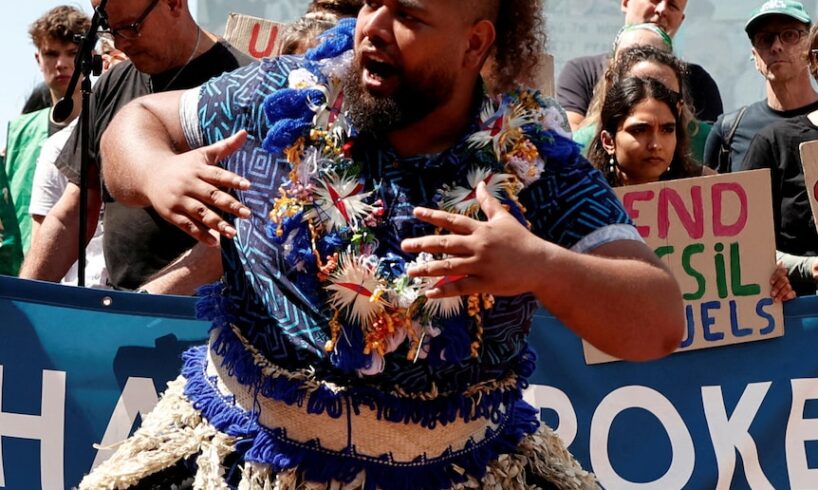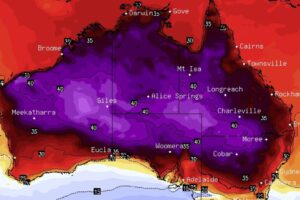
The world’s highest court has declared states have a legal obligation to tackle climate change and that failing to do so is a “wrongful act” that could open the door to reparations.
The landmark advisory opinion from the International Court of Justice (ICJ) is seen as a possible turning point in international climate law.
“Failure of a state to take appropriate action to protect the climate system … may constitute an internationally wrongful act,” court President Yuji Iwasawa said during the hearing.
“The legal consequences resulting from the commission of an internationally wrongful act may include … full reparations to injured states in the form of restitution, compensation and satisfaction.”
The court added that a “sufficient direct and certain causal nexus” had to be shown “between the wrongful act and the injury”.
In its non-binding opinion, which runs to more than 500 pages, the ICJ said a “clean, healthy and stable environment” is a human right.
Enshrining a sustainable environment as a human right opens the prospect of further legal action, including states returning to the ICJ to hold each other accountable, as well as domestic lawsuits and legal instruments including investment agreements.
The case was prompted by a group of law students from Vanuatu, and backed by more than 130 other countries.
Ralph Regenvanu, centre, helped Vanuatu spearhead the case at the international court. (AP Photo: Peter Dejong)
Vanuatu’s special envoy on climate change, Ralph Regenvanu, hailed the court’s decision as a “landmark milestone”.
“It’s a very important course correction in this critically important time,” Mr Regenvanu said.
“Even as fossil fuel expansion continues under the US’s influence, along with the loss of climate finance and technology transfer, and the lack of climate ambition following the US’s withdrawal from the Paris Agreement, major polluters, past and present, cannot continue to act with impunity and treat developing countries as sacrifice zones to further feed corporate greed.”
He said Vanuatu would now take the ruling back to the UN General Assembly to “pursue a resolution that will support implementation of this decision”.
Activists demonstrated outside the court on the day the advisory opinion was read out.
(AP Photo: Peter Dejong)
Advocates immediately cheered on hearing the court hand down its opinion.
“The ICJ’s decision brings us closer to a world where governments can no longer turn a blind eye to their legal responsibilities,” said director of Pacific Islands Students Fighting Climate Change, Vishal Prasad.
“It affirms a simple truth of climate justice: those who did the least to fuel this crisis deserve protection, reparations, and a future.”
All members of the United Nations are party to the court, including major emitters like the United States and China.
Two questions posed to ICJ judges
The 15 judges on the United Nations’s court were tasked with answering two questions:
First: what must states do under international law to protect the environment from greenhouse gas emissions “for present and future generations”?Second: what are the consequences for states whose emissions have caused environmental harm, especially to vulnerable low-lying island states?
ICJ president Yuji Iwasawa said climate change was an “urgent and existential threat”, adding the climate “must be protected for present and future generations” and the adverse effect of a warming planet “may significantly impair the enjoyment of certain human rights, including the right to life”.
The case was the biggest the ICJ had handled, with judges pouring over tens of thousand of pages of submissions from countries and organisations around the world, including Australia.
Vanuatu, Australia diverge in landmark ICJ climate change case
Outside the court in the Hague, about a hundred demonstrators waved flags and posters bearing slogans like “No more delay, climate justice today”.
They watched proceedings on a big screen, clapping and cheering at times during the two-hour hearing.
When it was over, others emerged from the courtroom laughing and hugging.
Courts have become a key battleground for climate action as frustration has grown over sluggish progress toward curbing planet-warming pollution from fossil fuels.
The Paris Agreement struck through the UN Framework Convention on Climate Change (UNFCCC) has rallied a global response to the crisis, but not at the speed necessary to protect the world from dangerous overheating.
More than 100 nations and groups gave submissions at a mammoth hearing in December in the Great Hall of Justice in the Hague.
Many hailed from distant Pacific Island nations, and delivered impassioned appeals in the sober arena while dressed in colourful traditional attire.
The courtroom was full at the International Court of Justice at the Hague for the final day of the case. (UN Photo/ICJ/Frank van Beek)
The debate pitted major wealthy economies against the smaller, less developed states most at the mercy of a warming planet.
Big polluters including the United States and India argued that legal provisions under the UNFCCC were sufficient and a re-examination of state responsibility in relation to climate action was not necessary.
But smaller states refuted this, saying the UN framework was inadequate to mitigate climate change’s devastating effects and that the ICJ’s opinion should be broader.
These states also urged the ICJ to impose reparations on historic polluters, a highly sensitive issue in global climate negotiations.
They also demanded a commitment and timeline to phasing out fossil fuels, monetary compensation when appropriate, and an acknowledgement of past wrongs.
ABC/wires





